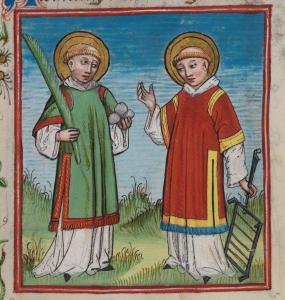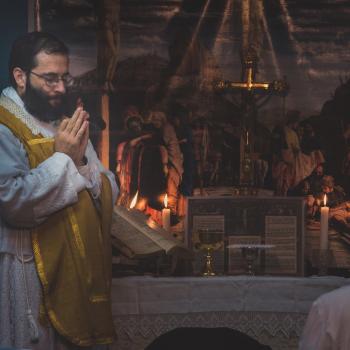
A bishop in the Amazon is doing the laudable act of forming catechists to lead a Sunday Scripture reading and prayer service in their town when neither a deacon nor priest can arrive. He also hopes that some male catechists will later become deacons. Two sites reported on this with the dishonest and misleading title, “Vatican Confirms: Women Already in Diaconate Formation.” Let me explain what is happening, then respond to their misunderstanding.
What Is Actually Happening
Some of the discussion in the Amazon synod has brought up the possibility of married men becoming priests. I find this doubtful given that Card. Ouellet said he was strongly against it and implied Pope Francis was even stronger against it. I also find good theological grounds for a celibate priesthood, but that would be a distraction here. A large argument people use for this is isolated communities that don’t regularly see a priest on Sundays.
One bishop had started a program to train catechists to lead a prayer service where they would gather together to read the assigned readings for that Sunday’s Mass. This is commendable.
As an aside, this bishop explained how a scene from The Mission is more accurate that I thought: “Bishop Wilmar told the story of how the indigenous people did not want to approach the missionaries at first until a Franciscan missionary won them over by playing his flute.”
Vatican news describes his plan:
They chose to begin with the Ministry of the Word, as the Eucharist cannot be preserved in these territories for very long. Formation for Ministers of the Word began in November 2017. 20 men and 4 women were appointed and began preaching the word of God in their own language.
He hopes that some of those going through this formation will eventually do further formation to be deacons. There is no indication that the ministers of the Word will become ministers of the Eucharist, let alone deacons. Obviously, given the discipline of the Church, the permanent diaconate would only be open to the male catechists.
The Call to Evangelize
All Catholics are called, by baptism, to evangelize. Providing training to laypeople helps them fulfill this mission. Having a trained layperson lead a prayer service without the Eucharist on Sundays when there is no priest is an excellent option to give the town communal prayer. Basing these prayer meetings off of the assigned readings for that week in the lectionary is a great way to give these people a connection to the wider Church and ensure they have a wide contact with Scripture.
The liturgical norms of the Church even suggest something like this. Redemptionis Sacramentum, published by the Vatican under St. John Paul II in 2004, notes the following.
“If participation at the celebration of the Eucharist is impossible on account of the absence of a sacred minister or for some other grave cause,” then it is the Christian people’s right that the diocesan Bishop should provide as far as he is able for some celebration to be held on Sundays for that community under his authority and according to the Church’s norms. Sunday celebrations of this specific kind, however, are to be considered altogether extraordinary. All Deacons or lay members of Christ’s faithful who are assigned a part in such celebrations by the diocesan Bishop should strive “to keep alive in the community a genuine ‘hunger’ for the Eucharist, so that no opportunity for the celebration of Mass will ever be missed, also taking advantage of the occasional presence of a Priest who is not impeded by Church law from celebrating Mass.”
As far as I could see, this bishop is trying to fulfill this so that those in remote villages at least hear the Scriptures and pray together every Sunday in a common gathering.
Female Deacons
The Vatican News story did note that the training so far was only for ministers of the Word, which is not an ordained position. It is a form of what the Church has generally referred to as catechists. Those in any Christian state of life can carry out such ministry. It would also seem logical that the bishop might see the men who go through with this as the most likely candidates he has for the permanent diaconate. This training is not the diaconate and those becoming deacons would require separate training later.
Obviously, the women being trained as catechists would not be able to go on to the diaconate. The Vatican news story does not explicitly state this but I think we can assume it. A news article can assume the reader has a basic understanding of the topic. For example, if an article says “President Trump,” we can reasonably assume that “President Donald J. Trump, current Republican President of the United States of America” is understood by most readers without specifying those details. Likewise, a Catholic news article can reasonably assume the reader understands women cannot be deacons. And such an article can reasonably assume the reader knows the difference between a catechist and a deacon while recognizing both need formation.
To remove any doubt about female deacons, two of the last three Popes have had commissions and concluded that there would not be female deacons, with Benedict probably coauthoring John Paul II’s statement as a Cardinal. When a topic has been determined twice in my lifetime by different Popes, I hope we can assume it and move on to other topics. We don’t need to beat a dead horse.
To assume that a bishop was forming female deacons when he was forming catechists of both sexes is a gross misunderstanding. It also lacks charity towards this bishop. It is a form of clericalism to think that priests and deacons should do everything: lay catechists can do many things like lead a reading of the week’s Gospel outside of Mass. Let’s seek to understand others in the Church and move forward together to transform this world for Christ.
Note: please help support me on Patreon so I can write more like this.












